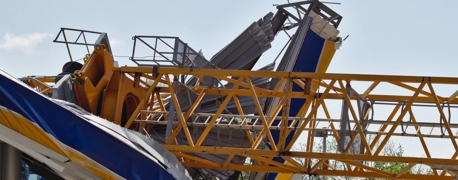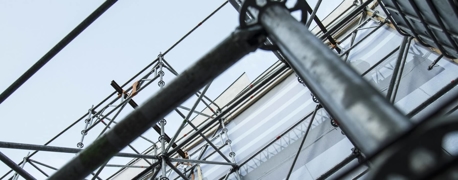Why Sleep Deprivation Makes Work Dangerous

Being busy and productive should not justify being dangerous in the workplace. Yet, many employers place their employees in harm’s way by putting them to work while they’re exhausted or sleep-deprived. While it might seem like an annoyance to workers, sleep deprivation can trigger life-altering accidents that place the lives and well-being of workers at risk.
Sleep-deprived workers are 70% more likely to be involved in work accidents, and fatigue causes an estimated $136.4 billion in lost productivity due to health issues in the U.S. each year.
How Much Sleep Should Workers Have?
Most experts agree that the average adult needs 7 to 9 hours of sleep to function properly, but several polls and studies have shown that most Americans are not meeting their sleep needs. According to the National Sleep Foundation’s 2020 Sleep in America® poll, 72% of Americans report feeling sleepy 2 or more days a week. Most feel sleepy an average of 3 days a week.
The problem of sleep deprivation is often overlooked because its effects are not always noticeable. It can be difficult to identify sleep deprivation as a direct cause of an incident, even though it is an underlying factor in workplace accidents and decreased productivity.
The Benefits of Good Sleep
You know the feeling of waking up after getting a good night’s sleep. It’s that feeling that you can tackle whatever the day brings. It’s that satisfying stretch and yawn before you get up and start your morning routine before going to work.
Getting good sleep is important in any line of work. It promotes physical recovery and can help improve mental health as well. As you sleep, tissues throughout your body are repaired and strengthened. Your cardiovascular system gets some much-needed rest. Your immune response gets stronger. Your brain gets the opportunity to create and maintain pathways that improve your ability to form memories and retain information. Unlike sleep-deprived workers, you’ll be ready to tackle your workday from both a physical and mental standpoint.
Sleep debt can quickly add up. Getting less than seven hours of sleep over four nights or more is equivalent to losing an entire night of sleep. Losing an entire night of sleep can affect brain function for up to two weeks, impacting every aspect of one’s life—including work performance.
Can a Worker Function on No Sleep for a Day?
The average person can survive without sleep for a day, but this does not mean they’ll be able to make any significant contributions at work. Even at 17 or 19 hours awake, a person could experience physical and mental impairment similar to a person with a .05% blood alcohol level. At 24 hours awake, this could be compared to having a blood alcohol level of .1%, which is well above the legal limit to operate a motor vehicle. It’s unclear how long a human being can survive without sleep, but the longest recorded time is just over 11 days. After just a few nights without sleep, a person can begin to hallucinate.
Sleep Deprivation Affects All Workers Across All Industries
At about 2:45 a.m. on June 25, 2021, the offshore supply vessel Elliot Cheramie collided with an uncrewed oil and gas production platform in the Gulf of Mexico, about 77 miles southwest of Port Fourchon, Louisiana. Four people were injured, and the collision caused about $362,000 in damages. A NIOSH investigation revealed that the primary cause was crew fatigue; the company failed to adhere to its 12-hour work limit policy, leading to the mate on watch falling asleep.
At about 12:55 a.m. on June 7, 2014, a Walmart Transportation tractor-trailer failed to slow for traffic on the New Jersey Turnpike near Cranbury, New Jersey, causing a 6-vehicle collision. The truck was traveling at 65 mph in a 45 mph construction zone when it crashed into a limo van, leading to the multi-vehicle accident. One person died at the scene, four were seriously injured, and five others suffered minor injuries. An NHTSA investigation revealed that the Walmart truck driver had been on duty for over 13.5 hours of a 14-hour shift and had only had 4 hours of sleep in the previous 33 hours.
These and countless other incidents serve as examples of the consequences of sleep deprivation—and any worker in any industry may be at risk. Whether it's a truck driver, a medical professional, or a factory worker, inadequate rest can impair judgment, slow reaction times, and increase the likelihood of mistakes.
Sleep Deprivation & Work Accidents: How They're Linked
Numerous studies have directly linked sleep deprivation to an increased risk of workplace accidents. A review of 27 observational studies found that workers who experience sleep problems are 1.62 times more likely to sustain work injuries than their well-rested counterparts. The review also found that about 13% of work-related injuries could be associated with sleep issues.
Workers most at risk for sleep deprivation are those who do shift work. In a Harvard Business Review study of hospital interns scheduled to work for 24+ consecutive hours, researchers found an increased risk of cutting themselves with a needle or scalpel (61%), being involved in a traffic accident (168%), or experiencing a near-miss (460%).
Now, let's consider the specific factors that link sleep deprivation and work accidents. This involves looking deeper into the different ways that sleep deprivation affects workers and their physical and mental abilities. Most of these complications impact productivity, reactivity, and other factors essential for everyday work.
Lack of Communication
Studies have shown that sleep-deprived workers do not communicate as well as rested workers. Lack of sleep causes them to lower their voice, pause between sentences, mumble, mispronounce words, repeat themselves, and lose their train of thought.
Decline in Performance
Tired workers see drastic declines in their performance and daily output levels. On average, sleep-deprived workers display performance levels in the 9th percentile compared to rested workers. In other words, employers who overwork employees aren’t getting the increased production they think they are getting from longer hours. Instead, they have a tired workforce that is as dangerous as it is underproducing.
Prone to Distractions
Research has shown an overlap in symptoms of sleep deprivation and ADHD. Some of those symptoms include an inability to focus, keep track of events, attend non-essential activities, and maintain an interest in outcomes. This is especially dangerous in settings such as industrial work or construction. Often, workers in these industries need to be focused so they can get their jobs done properly and safely. Exhaustion can trigger an accident that injures or kills dozens of workers.
Driving Impairments
The effects of driver fatigue or drowsy driving have been well-documented. Nearly 100,000 car accidents each year are caused at least in part by driver fatigue. Workers who are required to drive or operate heavy machinery such as forklifts are at much higher risk of being involved in an accident if they are tired. Studies have shown that sleep deprivation can slow down reaction times as much as being legally intoxicated.
Exhausted drivers:
- Focus less on the road
- Have slow reaction times
- Have impaired decision-making skills
Commercial drivers are the most likely members of the workforce to drive while exhausted. However, industries that require physically demanding work or long hours can also be responsible for placing exhausted workers on the road.
Decreased Cognitive Ability
Sleep deprivation is associated with a reduced ability to grasp and analyze new information. It has also been shown to decrease memory capacity and the ability to adjust when presented with new information. When workers are not able to think up to their normal capacity, they are more prone to accidents.
Behavior Modification
Workers who are not getting enough sleep tend to be more prone to mood swings. They can become socially withdrawn or even erupt in violent outbursts.
Common behavioral signs of sleep deprivation include:
- Irritability
- Impatience
- Disregard for social standards
- Inappropriate conduct
- Unwillingness to plan ahead
Additionally, a lack of sleep has been closely linked to depression.
Increased Risk-Taking
Sleep-deprived workers are more likely to engage in risky behaviors. Studies have shown that when people are deprived of sleep, there is an increase in activity in the part of the brain that prompts risky decisions and a decrease in activity in the part of the brain that controls rational thinking. When sleep-deprived workers are making riskier decisions, they and their coworkers are at unnecessary risk.
What Employers Can Do to Avoid Sleep Deprivation & Work Accidents
Some companies foster a “you-can-sleep-when-you’re-dead” culture, where employees are praised or rewarded for working extra hours, pulling all-nighters, or coming to work even when they’re sleep-deprived or ill. In industries like oil and gas, commercial trucking, or manufacturing, long shifts and night work are common, disrupting sleep cycles and increasing the risk of accidents.
Employers must implement and enforce policies that prioritize workers' need for sleep, just as they do for other workplace hazards. This includes limiting work schedules to no more than 12 hours per day, ensuring at least 11 consecutive hours of rest every 24 hours, and capping work hours at 60 per week. Employees should not be permitted to work more than 80 hours in any given week. To prevent sleep deficits, workers should have at least one day off each week, though two consecutive days off are preferable.
The link between sleep deprivation and accidents is well established. Employers must create a safe workplace by discouraging a culture that glorifies working while sleep-deprived or ill. If they fail to do so, they should be held accountable.
Lifting the Veil on Work Accidents & Sleep Deprivation
A single sleep-deprived worker is more prone to causing an accident, but the risk increases exponentially when nearly two out of three workers suffer from sleep deprivation. Employers must ensure their workers get the rest they need by avoiding overworking them at all costs.
Hard work and long hours should never come at the expense of safety and lives.
- Categories


